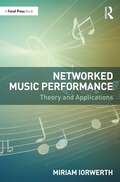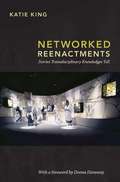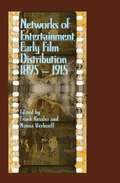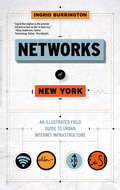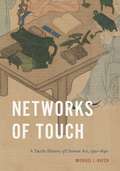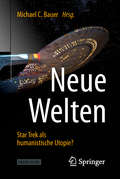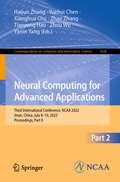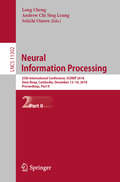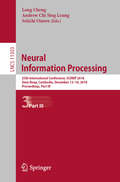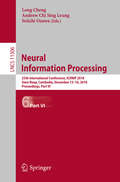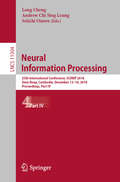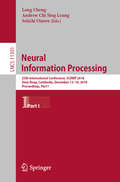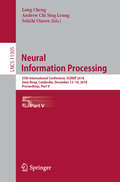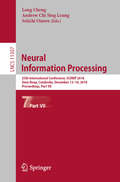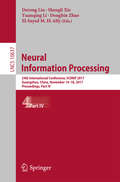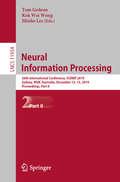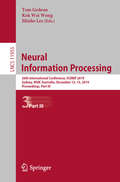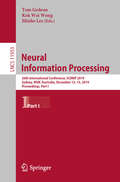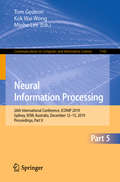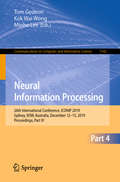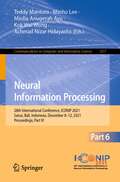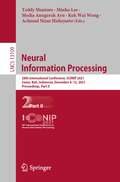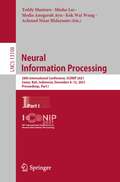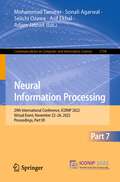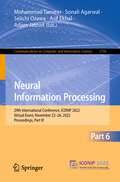- Table View
- List View
Networked Music Performance: Theory and Applications
by Miriam IorwerthNetworked Music Performance (NMP) is the essential guide to both playing music online and ensemble music through networks. Offering a range of case studies, from highly technical solutions to inclusive community projects, this book provides inspiration to musicians to try NMP whatever their level of technical expertise. Drawing upon recent research to examine the background and history of the practice as well as specific practical approaches, technical and musical considerations are included for readers, as are ideas around accessibility and creativity. Accessibility is considered in the context of the opportunities that NMP gives to musicians working remotely, as well as some of the barriers to participation in NMP and how these can be overcome. Synchronous and asynchronous approaches to NMP are explored in detail, examining the technical and musical affordances and challenges of working remotely for musicians. Networked Music Performance will appeal to music and music technology students as well as professional musicians and technicians who have started working online and wish to improve their practice. As NMP in the context of music education and community music are also explored, this book supplies educators and community leaders with knowledge and practical guidance on how to move their practice online.
Networked Reenactments: Stories Transdisciplinary Knowledges Tell
by Katie KingSince the 1990s, the knowledge, culture, and entertainment industries have found themselves experimenting, not altogether voluntarily, with communicating complex information across multiple media platforms. Against a backdrop of competing national priorities, changing technologies, globalization, and academic capitalism, these industries have sought to reach increasingly differentiated local audiences, even as distributed production practices have made the lack of authorial control increasingly obvious. As Katie King describes in Networked Reenactments, science-styled television--such as the Secrets of Lost Empires series shown on the PBS program Nova--demonstrates how new technical and collaborative skills are honed by television producers, curators, hobbyists, fans, and even scholars. Examining how transmedia storytelling is produced across platforms such as television and the web, she analyzes what this all means for the humanities. What sort of knowledge projects take up these skills, attending to grain of detail, evoking affective intensities, and zooming in and out, representing multiple scales, as well as many different perspectives? And what might this mean for feminist transdisciplinary work, or something sometimes called the posthumanities?
Networks of Entertainment: Early Film Distribution, 1895–1915 (Early Cinema in Review)
by Frank Kessler and Nanna VerhoeffEssays by prominent scholars examining film distribution in the early years of cinema.This collection of essays explores the complex issue of film distribution from the invention of cinema into the 1910s. From regional distribution networks to international marketing strategies, from the analysis of distribution catalogs to case studies on individual distributors, these essays written by well-known specialists in the field discuss the intriguing question of how films came to meet their audiences.Contributors include Richard Abel, Marta Braun, Joseph Garncarz, André Gaudreault, François Jost, Charlie Keil, Martin Loiperdinger, Viva Paci, Wanda Strauven, Gregory Waller, and many more.
Networks of New York: An Illustrated Field Guide to Urban Internet Infrastructure
by Ingrid BurringtonA guided tour of the physical Internet, as seen on, above, and below the city's streets What does the Internet look like? It's the single most essentail aspect of modern life, and yet, for many of us, the Internet looks like an open browser, or the black mirrors of our phones and computers. But in Networks of New York, Ingrid Burrington lifts our eyes from our screens to the streets, showing us that the Internet is everywhere around us, all the time--we just have to know where to look. Using New York as her point of reference and more than fifty color illustrations as her map, Burrington takes us on a tour of the urban network: She decodes spray-painted sidewalk markings, reveals the history behind cryptic manhole covers, shuffles us past subway cameras and giant carrier hotels, and peppers our journey with background stories about the NYPD's surveillance apparatus, twentieth-century telecommunication monopolies, high frequency trading on Wall Street, and the downtown building that houses the offices of both Google and the FBI's Joint Terrorism Task Force. From a rising star in the field of tech jounalism, Networks of New York is a smart, funny, and beautifully designed guide to the endlessly fascinating networks of urban Internet infrastructure. The Internet, Burrington shows us, is hiding in plain sight.From the Hardcover edition.
Networks of Touch: A Tactile History of Chinese Art, 1790–1840 (Perspectives on Sensory History)
by Michael J. HatchIn early nineteenth-century China, a remarkable transformation took place in the art world: artists among China’s educated elites began to use touch to forge a more authentic relationship to the past, to challenge stagnant artistic canons, and to foster deeper human connections. Networks of Touch is an engaging exploration of this sensory turn.In this book, Michael J. Hatch examines the artistic network of Ruan Yuan (1764–1849), a scholar-official whose patronage supported a generation of artists and learned people who prioritized epigraphic research as a means of truing the warped contours of Confucian heritage. Their work instigated an “epigraphic aesthetic”—an appropriation of the stylistic, material, and tactile features of ancient inscribed objects and their reproductive technologies—in late eighteenth- and early nineteenth-century artwork. Rubbings, a reduplicative technology, challenged the dominance of brushwork as the bearer of artistic authority. While brushwork represented the artist’s physical presence through ink and paper, rubbings were direct facsimiles of tactile experiences with objects. This shift empowered artists and scholars to transcend traditional conventions and explore new mediums, uniting previously separate image-making practices while engaging audiences through the senses.Centering on touch and presenting a fresh perspective on early nineteenth-century literati art in China, this volume sheds light on a period often dismissed as lacking innovation and calls into question optical realism’s perceived supremacy in reshaping the sensory experience of the modern Chinese viewer.
Neue Welten - Star Trek als humanistische Utopie?
by Michael C. BauerAm 8. September 1966 schrieb die NBC Fernsehgeschichte: An diesem Tag strahlte der US-amerikanische Fernsehsender die erste Folge einer neuen Science-Fiction-Serie aus, mit einer Geschichte über eine außerirdische Lebensform, die Salz zum Überleben braucht und aus Verzweiflung mehrere Mannschaftsmitglieder des Raumschiffes Enterprise ermordet. So recht ahnte bei NBC wohl niemand, dass in diesen 50 Minuten der Grundstein für ein ungeheuer erfolgreiches Science-Fiction-Franchise gelegt wurde: Star Trek. Allein der 50. Geburtstag von Star Trek wäre schon Grund genug gewesen, der Serie eine wissenschaftliche Tagung zu widmen. Noch dazu kommt: Ihrem Erfinder Gene Roddenberry wird nachgesagt, „seine“ Serie nach seinen eigenen humanistischen Überzeugungen geformt, im Star Trek-Universum mithin eine humanistische Utopie verwirklicht zu haben. Aber stimmt das? Ist die Zukunftsvision von Star Trek eine, in der alle humanistischen Ideale erfüllt sind? Eine Welt, in der friedliche Kooperation und die freie Entfaltung aller Individuen die (oft genug auch mörderische) Konkurrenz hinter sich gelassen haben? Diesen und vielen weiteren spannenden Fragen rund um Star Trek gingen die Gäste einer hochkarätigen, interdisziplinären Tagung vom 15. bis 17. April 2016 in Nürnberg nach. Eingeladen hatte der Humanistische Verband Bayern. Der vorliegende Band dokumentiert die Beiträge.
Neural Computing for Advanced Applications: Third International Conference, NCAA 2022, Jinan, China, July 8–10, 2022, Proceedings, Part II (Communications in Computer and Information Science #1638)
by Haijun Zhang Yuehui Chen Xianghua Chu Zhao Zhang Tianyong Hao Zhou Wu Yimin YangThe two-volume Proceedings set CCIS 1637 and 1638 constitutes the refereed proceedings of the Third International Conference on Neural Computing for Advanced Applications, NCAA 2022, held in Jinan, China, during July 8–10, 2022. The 77 papers included in these proceedings were carefully reviewed and selected from 205 submissions. These papers were categorized into 10 technical tracks, i.e., neural network theory, and cognitive sciences, machine learning, data mining, data security & privacy protection, and data-driven applications, computational intelligence, nature-inspired optimizers, and their engineering applications, cloud/edge/fog computing, the Internet of Things/Vehicles (IoT/IoV), and their system optimization, control systems, network synchronization, system integration, and industrial artificial intelligence, fuzzy logic, neuro-fuzzy systems, decision making, and their applications in management sciences, computer vision, image processing, and their industrial applications, natural language processing, machine translation, knowledge graphs, and their applications, Neural computing-based fault diagnosis, fault forecasting, prognostic management, and system modeling, and Spreading dynamics, forecasting, and other intelligent techniques against coronavirus disease (COVID-19).
Neural Information Processing: 25th International Conference, ICONIP 2018, Siem Reap, Cambodia, December 13–16, 2018, Proceedings, Part II (Lecture Notes in Computer Science #11302)
by Long Cheng Andrew Chi Sing Leung Seiichi OzawaThe seven-volume set of LNCS 11301-11307, constitutes the proceedings of the 25th International Conference on Neural Information Processing, ICONIP 2018, held in Siem Reap, Cambodia, in December 2018.The 401 full papers presented were carefully reviewed and selected from 575 submissions. The papers address the emerging topics of theoretical research, empirical studies, and applications of neural information processing techniques across different domains. The second volume, LNCS 11302, is organized in topical sections on other neural network models, stability analysis, optimization, and supervised learning.
Neural Information Processing: 25th International Conference, ICONIP 2018, Siem Reap, Cambodia, December 13–16, 2018, Proceedings, Part III (Lecture Notes in Computer Science #11303)
by Long Cheng Andrew Chi Sing Leung Seiichi OzawaThe seven-volume set of LNCS 11301-11307, constitutes the proceedings of the 25th International Conference on Neural Information Processing, ICONIP 2018, held in Siem Reap, Cambodia, in December 2018.The 401 full papers presented were carefully reviewed and selected from 575 submissions. The papers address the emerging topics of theoretical research, empirical studies, and applications of neural information processing techniques across different domains. The third volume, LNCS 11303, is organized in topical sections on embedded learning, transfer learning, reinforcement learning, and other learning approaches.
Neural Information Processing: 25th International Conference, ICONIP 2018, Siem Reap, Cambodia, December 13–16, 2018, Proceedings, Part VI (Lecture Notes in Computer Science #11306)
by Long Cheng Andrew Chi Sing Leung Seiichi OzawaThe seven-volume set of LNCS 11301-11307 constitutes the proceedings of the 25th International Conference on Neural Information Processing, ICONIP 2018, held in Siem Reap, Cambodia, in December 2018.The 401 full papers presented were carefully reviewed and selected from 575 submissions. The papers address the emerging topics of theoretical research, empirical studies, and applications of neural information processing techniques across different domains. The 6th volume, LNCS 11306, is organized in topical sections on time-series analysis; social systems; and image and signal processing.
Neural Information Processing: 25th International Conference, ICONIP 2018, Siem Reap, Cambodia, December 13-16, 2018, Proceedings, Part IV (Lecture Notes in Computer Science #11304)
by Long Cheng Andrew Chi Sing Leung Seiichi OzawaThe seven-volume set of LNCS 11301-11307, constitutes the proceedings of the 25th International Conference on Neural Information Processing, ICONIP 2018, held in Siem Reap, Cambodia, in December 2018.The 401 full papers presented were carefully reviewed and selected from 575 submissions. The papers address the emerging topics of theoretical research, empirical studies, and applications of neural information processing techniques across different domains. The 4th volume, LNCS 11304, is organized in topical sections on feature selection, clustering, classification, and detection.
Neural Information Processing: 25th International Conference, ICONIP 2018, Siem Reap, Cambodia, December 13-16, 2018, Proceedings, Part I (Lecture Notes in Computer Science #11301)
by Long Cheng Andrew Chi Sing Leung Seiichi OzawaThe seven-volume set of LNCS 11301-11307, constitutes the proceedings of the 25th International Conference on Neural Information Processing, ICONIP 2018, held in Siem Reap, Cambodia, in December 2018.The 401 full papers presented were carefully reviewed and selected from 575 submissions. The papers address the emerging topics of theoretical research, empirical studies, and applications of neural information processing techniques across different domains. The first volume, LNCS 11301, is organized in topical sections on deep neural networks, convolutional neural networks, recurrent neural networks, and spiking neural networks.
Neural Information Processing: 25th International Conference, ICONIP 2018, Siem Reap, Cambodia, December 13–16, 2018, Proceedings, Part V (Lecture Notes in Computer Science #11305)
by Long Cheng Andrew Chi Sing Leung Seiichi OzawaThe seven-volume set of LNCS 11301-11307 constitutes the proceedings of the 25th International Conference on Neural Information Processing, ICONIP 2018, held in Siem Reap, Cambodia, in December 2018.The 401 full papers presented were carefully reviewed and selected from 575 submissions. The papers address the emerging topics of theoretical research, empirical studies, and applications of neural information processing techniques across different domains. The 5th volume, LNCS 11305, is organized in topical sections on prediction; pattern recognition; and word, text and document processing.
Neural Information Processing: 25th International Conference, ICONIP 2018, Siem Reap, Cambodia, December 13–16, 2018, Proceedings, Part VII (Lecture Notes in Computer Science #11307)
by Long Cheng Andrew Chi Sing Leung Seiichi OzawaThe seven-volume set of LNCS 11301-11307, constitutes the proceedings of the 25th International Conference on Neural Information Processing, ICONIP 2018, held in Siem Reap, Cambodia, in December 2018.The 401 full papers presented were carefully reviewed and selected from 575 submissions. The papers address the emerging topics of theoretical research, empirical studies, and applications of neural information processing techniques across different domains. The 7th and final volume, LNCS 11307, is organized in topical sections on robotics and control; biomedical applications; and hardware.
Neural Information Processing: 24th International Conference, ICONIP 2017, Guangzhou, China, November 14–18, 2017, Proceedings, Part IV (Lecture Notes in Computer Science #10637)
by Derong Liu, Shengli Xie, Yuanqing Li, Dongbin Zhao and El-Sayed M. El-AlfyThe six volume set LNCS 10634, LNCS 10635, LNCS 10636, LNCS 10637, LNCS 10638, and LNCS 10639 constitues the proceedings of the 24rd International Conference on Neural Information Processing, ICONIP 2017, held in Guangzhou, China, in November 2017. The 563 full papers presented were carefully reviewed and selected from 856 submissions. The 6 volumes are organized in topical sections on Machine Learning, Reinforcement Learning, Big Data Analysis, Deep Learning, Brain-Computer Interface, Computational Finance, Computer Vision, Neurodynamics, Sensory Perception and Decision Making, Computational Intelligence, Neural Data Analysis, Biomedical Engineering, Emotion and Bayesian Networks, Data Mining, Time-Series Analysis, Social Networks, Bioinformatics, Information Security and Social Cognition, Robotics and Control, Pattern Recognition, Neuromorphic Hardware and Speech Processing.
Neural Information Processing: 26th International Conference, ICONIP 2019, Sydney, NSW, Australia, December 12–15, 2019, Proceedings, Part II (Lecture Notes in Computer Science #11954)
by Tom Gedeon Kok Wai Wong Minho LeeThe three-volume set of LNCS 11953, 11954, and 11955 constitutes the proceedings of the 26th International Conference on Neural Information Processing, ICONIP 2019, held in Sydney, Australia, in December 2019.The 173 full papers presented were carefully reviewed and selected from 645 submissions. The papers address the emerging topics of theoretical research, empirical studies, and applications of neural information processing techniques across different domains. The second volume, LNCS 11954, is organized in topical sections on image processing by neural techniques; learning from incomplete data; model compression and optimisation; neural learning models; neural network applications; and social network computing.
Neural Information Processing: 26th International Conference, ICONIP 2019, Sydney, NSW, Australia, December 12–15, 2019, Proceedings, Part III (Lecture Notes in Computer Science #11955)
by Tom Gedeon Kok Wai Wong Minho LeeThe three-volume set of LNCS 11953, 11954, and 11955 constitutes the proceedings of the 26th International Conference on Neural Information Processing, ICONIP 2019, held in Sydney, Australia, in December 2019.The 173 full papers presented were carefully reviewed and selected from 645 submissions. The papers address the emerging topics of theoretical research, empirical studies, and applications of neural information processing techniques across different domains. The third volume, LNCS 11955, is organized in topical sections on semantic and graph based approaches; spiking neuron and related models; text computing using neural techniques; time-series and related models; and unsupervised neural models.
Neural Information Processing: 26th International Conference, ICONIP 2019, Sydney, NSW, Australia, December 12–15, 2019, Proceedings, Part I (Lecture Notes in Computer Science #11953)
by Tom Gedeon Kok Wai Wong Minho LeeThe three-volume set of LNCS 11953, 11954, and 11955 constitutes the proceedings of the 26th International Conference on Neural Information Processing, ICONIP 2019, held in Sydney, Australia, in December 2019. The 173 full papers presented were carefully reviewed and selected from 645 submissions. The papers address the emerging topics of theoretical research, empirical studies, and applications of neural information processing techniques across different domains. The first volume, LNCS 11953, is organized in topical sections on adversarial networks and learning; convolutional neural networks; deep neural networks; feature learning and representation; human centred computing; human centred computing and medicine; hybrid models; and artificial intelligence and cybersecurity.
Neural Information Processing: 26th International Conference, ICONIP 2019, Sydney, NSW, Australia, December 12–15, 2019, Proceedings, Part V (Communications in Computer and Information Science #1143)
by Tom Gedeon Kok Wai Wong Minho LeeThe two-volume set CCIS 1142 and 1143 constitutes thoroughly refereed contributions presented at the 26th International Conference on Neural Information Processing, ICONIP 2019, held in Sydney, Australia, in December 2019.For ICONIP 2019 a total of 345 papers was carefully reviewed and selected for publication out of 645 submissions. The 168 papers included in this volume set were organized in topical sections as follows: adversarial networks and learning; convolutional neural networks; deep neural networks; embeddings and feature fusion; human centred computing; human centred computing and medicine; human centred computing for emotion; hybrid models; image processing by neural techniques; learning from incomplete data; model compression and optimization; neural network applications; neural network models; semantic and graph based approaches; social network computing; spiking neuron and related models; text computing using neural techniques; time-series and related models; and unsupervised neural models.
Neural Information Processing: 26th International Conference, ICONIP 2019, Sydney, NSW, Australia, December 12–15, 2019, Proceedings, Part IV (Communications in Computer and Information Science #1142)
by Tom Gedeon Kok Wai Wong Minho LeeThe two-volume set CCIS 1142 and 1143 constitutes thoroughly refereed contributions presented at the 26th International Conference on Neural Information Processing, ICONIP 2019, held in Sydney, Australia, in December 2019.For ICONIP 2019 a total of 345 papers was carefully reviewed and selected for publication out of 645 submissions. The 168 papers included in this volume set were organized in topical sections as follows: adversarial networks and learning; convolutional neural networks; deep neural networks; embeddings and feature fusion; human centred computing; human centred computing and medicine; human centred computing for emotion; hybrid models; image processing by neural techniques; learning from incomplete data; model compression and optimization; neural network applications; neural network models; semantic and graph based approaches; social network computing; spiking neuron and related models; text computing using neural techniques; time-series and related models; and unsupervised neural models.
Neural Information Processing: 28th International Conference, ICONIP 2021, Sanur, Bali, Indonesia, December 8–12, 2021, Proceedings, Part VI (Communications in Computer and Information Science #1517)
by Minho Lee Kok Wai Wong Teddy Mantoro Media Anugerah Ayu Achmad Nizar HidayantoThe two-volume set CCIS 1516 and 1517 constitutes thoroughly refereed short papers presented at the 28th International Conference on Neural Information Processing, ICONIP 2021, held in Sanur, Bali, Indonesia, in December 2021.* The volume also presents papers from the workshop on Artificial Intelligence and Cyber Security, held during the ICONIP 2021. The 176 short and workshop papers presented in this volume were carefully reviewed and selected for publication out of 1093 submissions. The papers are organized in topical sections as follows: theory and algorithms; AI and cybersecurity; cognitive neurosciences; human centred computing; advances in deep and shallow machine learning algorithms for biomedical data and imaging; reliable, robust, and secure machine learning algorithms; theory and applications of natural computing paradigms; applications.* The conference was held virtually due to the COVID-19 pandemic.
Neural Information Processing: 28th International Conference, ICONIP 2021, Sanur, Bali, Indonesia, December 8–12, 2021, Proceedings, Part II (Lecture Notes in Computer Science #13109)
by Teddy Mantoro Minho Lee Media Anugerah Ayu Kok Wai Wong Achmad Nizar HidayantoThe four-volume proceedings LNCS 13108, 13109, 13110, and 13111 constitutes the proceedings of the 28th International Conference on Neural Information Processing, ICONIP 2021, which was held during December 8-12, 2021. The conference was planned to take place in Bali, Indonesia but changed to an online format due to the COVID-19 pandemic. The total of 226 full papers presented in these proceedings was carefully reviewed and selected from 1093 submissions. The papers were organized in topical sections as follows: Part I: Theory and algorithms; Part II: Theory and algorithms; human centred computing; AI and cybersecurity; Part III: Cognitive neurosciences; reliable, robust, and secure machine learning algorithms; theory and applications of natural computing paradigms; advances in deep and shallow machine learning algorithms for biomedical data and imaging; applications; Part IV: Applications.
Neural Information Processing: 28th International Conference, ICONIP 2021, Sanur, Bali, Indonesia, December 8–12, 2021, Proceedings, Part I (Lecture Notes in Computer Science #13108)
by Teddy Mantoro Minho Lee Media Anugerah Ayu Kok Wai Wong Achmad Nizar HidayantoThe four-volume proceedings LNCS 13108, 13109, 13110, and 13111 constitutes the proceedings of the 28th International Conference on Neural Information Processing, ICONIP 2021, which was held during December 8-12, 2021. The conference was planned to take place in Bali, Indonesia but changed to an online format due to the COVID-19 pandemic. The total of 226 full papers presented in these proceedings was carefully reviewed and selected from 1093 submissions. The papers were organized in topical sections as follows: Part I: Theory and algorithms; Part II: Theory and algorithms; human centred computing; AI and cybersecurity; Part III: Cognitive neurosciences; reliable, robust, and secure machine learning algorithms; theory and applications of natural computing paradigms; advances in deep and shallow machine learning algorithms for biomedical data and imaging; applications; Part IV: Applications.
Neural Information Processing: 29th International Conference, ICONIP 2022, Virtual Event, November 22–26, 2022, Proceedings, Part VII (Communications in Computer and Information Science #1794)
by Mohammad Tanveer Sonali Agarwal Seiichi Ozawa Asif Ekbal Adam JatowtThe four-volume set CCIS 1791, 1792, 1793 and 1794 constitutes the refereed proceedings of the 29th International Conference on Neural Information Processing, ICONIP 2022, held as a virtual event, November 22–26, 2022. The 213 papers presented in the proceedings set were carefully reviewed and selected from 810 submissions. They were organized in topical sections as follows: Theory and Algorithms; Cognitive Neurosciences; Human Centered Computing; and Applications.The ICONIP conference aims to provide a leading international forum for researchers, scientists, and industry professionals who are working in neuroscience, neural networks, deep learning, and related fields to share their new ideas, progress, and achievements.
Neural Information Processing: 29th International Conference, ICONIP 2022, Virtual Event, November 22–26, 2022, Proceedings, Part VI (Communications in Computer and Information Science #1793)
by Mohammad Tanveer Sonali Agarwal Seiichi Ozawa Asif Ekbal Adam JatowtThe four-volume set CCIS 1791, 1792, 1793 and 1794 constitutes the refereed proceedings of the 29th International Conference on Neural Information Processing, ICONIP 2022, held as a virtual event, November 22–26, 2022. The 213 papers presented in the proceedings set were carefully reviewed and selected from 810 submissions. They were organized in topical sections as follows: Theory and Algorithms; Cognitive Neurosciences; Human Centered Computing; and Applications.The ICONIP conference aims to provide a leading international forum for researchers, scientists, and industry professionals who are working in neuroscience, neural networks, deep learning, and related fields to share their new ideas, progress, and achievements.
